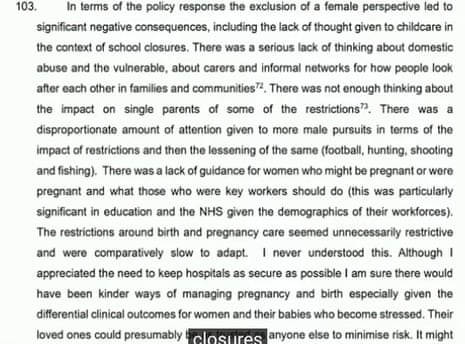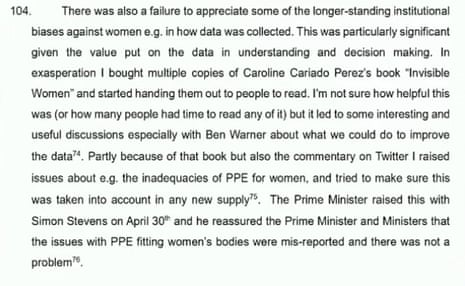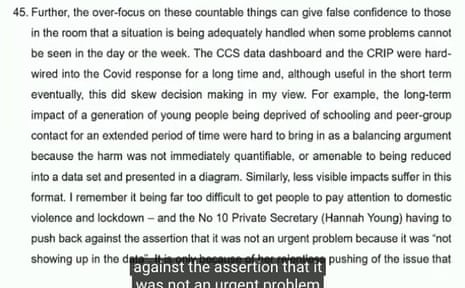
Lack of ‘female perspective’ in No 10 created problems with Covid policymaking, inquiry hears
O’Connor presents an extract from MacNamara’s witness statement in which she said the lack of a “female perspective” in No 10 created a problem in Covid policymaking. She suggests there was more focus on issues like shooting and football than domestic abuse or pregnancy as a result.

Key events
-
38m ago
Johnson ‘rarely accepted that to govern is to choose’, MacNamara says
-
1h ago
Getting No 10 to focus on domestic violence ‘far too difficult’ during Covid, says MacNamara
-
1h ago
Lack of ‘female perspective’ in No 10 created problems with Covid policymaking, inquiry hears
-
1h ago
MacNamara resumes giving evidence to Covid inquiry
-
2h ago
MacNamara says situation that led to her Partygate fine ‘much more complex’ than reports suggest
-
2h ago
MacNamara says Matt Hancock was regularly telling No 10 things ‘they later discovered weren’t true’
-
3h ago
Johnson objected to regular meetings with first ministers because it would make UK look like ‘mini EU’, inquiry hears
-
3h ago
Shadow cabinet ministers sometimes got more chance to question science advisers than cabinet did, inquiry hears
-
3h ago
MacNamara says hundreds of civil servants, and ministers, now think they may have broken Covid rules
-
3h ago
MacNamara says she does not think there was any single day when Covid guidance was fully followed in No 10
-
3h ago
MacNamara says Cummings’ ‘misogynist’ abuse partly response to her blocking his attempt to cover up how he sacked aide
-
3h ago
Women working in No 10 felt ‘invisible’ because of macho culture, inquiry hears
-
3h ago
MacNamara says ‘superhero bunfight’ culture at No 10 would never have happened under Theresa May
-
4h ago
No 10 had to ‘make up’ plan for what would happen when PM incapacitated, inquiry hears
-
4h ago
MacNamara concerned about ‘absence of humanity’ being feature of government’s response to Covid
-
4h ago
MacNamara suggests, once No 10 realised lockdown necessary, it could not have happened faster ‘in safe way’
-
5h ago
Matt Hancock assured cabinet ‘time and time again’ he had plan to deal with Covid, inquiry hears
-
5h ago
MacNamara tells inquiry she was concerned about Johnson’s ‘jovial tone’ about Covid threat in early March 2020
-
5h ago
Helen MacNamara tells inquiry Cabinet Office made it ‘extraordinarily difficult’ for her to access past Covid paperwork
-
6h ago
Dowden refuses to say it was shocking for Johnson to describe Covid as ‘nature’s way of dealing with old people’
-
6h ago
Oliver Dowden urges people to wait until Boris Johnson presents his side of the story at Covid inquiry

Severin Carrell
Scottish Labour has significantly increased its lead over the Scottish National party, taking a six-point lead over its rivals, according to a respected academic survey from the Scottish Election Study.
Its quarterly coop poll put Labour on 38% and the SNP on 32%, after don’t knows were removed, giving Labour its largest lead since 2010 and appearing to confirm a consistent rise in support for Keir Starmer’s party in Scotland.
The Scoop data suggests undecided voters are switching to Labour, as have a fifth of SNP voters, 38% of Liberal Democrat voters and nearly a fifth of Conservative voters. Two-thirds of Scottish voters expect Labour to win the next general election.
The poll, conducted by YouGov, was carried out in late October after Humza Yousaf’s first national conference as SNP leader, where he unveiled a council tax freeze, and after his party’s devastating defeat in the Rutherglen and Hamilton West byelection.
Unfortunately for Yousaf, Scoop found voter allegiance to the SNP has slipped significantly: only 55% of voters who backed the SNP in the 2019 general election plan to at the next election. The Tories fared far worse: only 48% of their voters will back them again.
The Scottish government’s reputation among voters has also fallen, YouGov found. It had a minus 20 satisfaction rating, although that remains far better than Rishi Sunak’s administration in London. The UK government’s satisfaction rating was an Arctic -68.
The Scottish Election Study is based at the University of Edinburgh and funded by the Economic and Social Research Council.
Heather Hallett, the chair, asks a final question. She wants to know what powers special advisers have.
MacNamara says in theory special advisers cannot direct civil servants. She says in practice they can, if a special adviser asks for something on behalf of the PM. But she says during this period sometimes advisers were, from their own initiative, asking civil servants to act.
And that’s the end of MacNamara’s evidence.
Johnson ‘rarely accepted that to govern is to choose’, MacNamara says
O’Connor quotes from another passage in MacNamara’s witness statement. In it MacNamara said:
The prime minister rarely accepted that to govern is to choose. He really did want it all and changed his mind often.
The decision-making swung between two extremes, the prime minister’s undoubted liberal instincts and then the extremes of shutting everything down, when in reality all of the discussion and debate and choices were in the middle.
O’Connor turns to schools. He says that, in her witness statement, MacNamara says that, after the permanent secretary at the Department for Education was forced to resign over the exam grading fiasco, she was told by Simon Case, the cabinet secretary, that Boris Johnson intended to ensure that Gavin Wiliamson, the education secretary, would also have to move at some point soon.
O’Connor says MacNamara also raised the issue of whether PPE was designed to fit women’s bodies. She addressed this in her witness statement.

MacNamara says this issue eventually got raised by the PM in a meeting. She says she thinks a colleague persuaded the PM to raise this issue because that was the only means of getting a response.
Getting No 10 to focus on domestic violence ‘far too difficult’ during Covid, says MacNamara
MacNamara says she thinks more people will have been harmed as a result of domestic abuse during lockdown. An email is shown in which she said: “It is very difficult to draw any conclusion other than women have died as a result of this.”
O’Connor shows another extract from her witness statement addressing this. In it MacNamara says it was “far too difficult” to get colleagues in No 10 to focus on domestic violence.

UPDATE: MacNamara said:
People don’t want to think about these things, so you don’t want to think that awful things happen to children and partners and parents in their own home.
If you are a more experienced civil servant … you have a different sense of these things and I think it goes to who is involved and advising in decision-making, and are they able to bring the full gamut of what the state actually knows about what sometimes happens.
I feel that it was quite lopsided at this point. We were looking at harm through a very narrow lens without realising that of course there can be all sorts of consequences of other things you can’t see.
Lack of ‘female perspective’ in No 10 created problems with Covid policymaking, inquiry hears
O’Connor presents an extract from MacNamara’s witness statement in which she said the lack of a “female perspective” in No 10 created a problem in Covid policymaking. She suggests there was more focus on issues like shooting and football than domestic abuse or pregnancy as a result.

MacNamara resumes giving evidence to Covid inquiry
Helen MacNamara, the former deputy cabinet secretary, is back giving evidence at the Covid inquiry.
Andrew O’Connor, counsel for the inquiry, asks about a passage in her witness statement where she said that, although colleagues were sympathetic to the idea that some groups were suffering disproportionately because of Covid, there was an assumption that these were “naturally occuring” consequences.
MacNamara says she was concerned that people did not appreciate the extent to which these inequalities were related to government decisions.
MacNamara says situation that led to her Partygate fine ‘much more complex’ than reports suggest
In her evidence this morning Helen MacNamara said she felt “profound regret” about the leaving party with karaoke machine that led to her being fined for breaking lockdown rules. She said:
My profound regret is for the damage that’s been caused to so many people because of it, as well as just the mortifying experience of seeing what that looks like and how rightly offended everybody is in retrospect.
I absolutely knew and thought it was actually important for there to be space for – particularly the private office – to be able to gather together and spend time together.
That was entirely because of the kind of culture that they were working in and entirely because I was really worried about individuals breaking and suffering, and whether they were going to be OK, and how important their colleagues were to each other.
I’m saying none of that in excuse of my own misjudgment. I’m saying none of that in excuse of thinking any of these things were OK. But it was a much more complex situation than has allowed to be presented for lots of different reasons.
In her evidence to the inquiry Helen MacNamara said that at one point Matt Hancock, the health secretary, posed as a batsman while discussing Covid. In her witness statement she said:
He reassured me that he was ‘loving responsibility’ and to demonstrate this took up a batsman’s stance outside the cabinet room and said: ‘They bowl them at me, I knock them away.’
MacNamara said the anecdote said something about Hancock’s over-confidence. She said:
It does partly go back to my point about nuclear levels of confidence that were being deployed, which I do think is a problem.
It really stuck with me, this moment, and I thought … I have tried throughout this statement to give you the most honest and best account I can of what it was like to be there, because I think that is the best service that I can do in terms of you being able to come to some conclusions.

Caroline Davies
King Charles recorded a video message to be played at the opening session of the AI safety summit taking place at Bletchley Park. He said:
Transitions, like the one AI is heralding, always present profound challenges; especially in preparing for unintended consequences. It is incumbent on those with responsibility to meet these challenges: to protect people’s privacy and livelihoods, which are essential to both our economic and psychological well-being, to secure our democracies from harm, and to ensure the benefits of new technology are shared by all.
I have always believed in the importance of holding a conversation both within and across societies to address such great challenges; of bringing governments and the public sector together with civil society and the private sector in that conversation, adhering to the values, tenets of faith and laws that we all hold so dear. That is how the international community has sought to tackle climate change, to light a path to net zero, and safeguard the future of our planet. We must similarly address the risks presented by AI with a sense of urgency, unity and collective strength.
In his commentary on Helen MacNamara’s evidence this morning on his Substack blog, Dominic Cummings has posted this about his language about her.
Re my terrible language referring to Helen and others… Yes, my language is bad. But it’s mental to focus on my language rather than the fact that the Cabinet Office *was killing people* by pulling people out of emergency covid work to deal with Cabinet Office HR fuckups and ludicrous legal cases about the fuckups of the first wave! Kafka does not do this justice. And I guess this will never be addressed by the Inquiry. Too mental for people to get their heads around …
This does not really address her point that he was being vindictive because she had legitimate objections to how he wanted to deal with two issues. (See 12.25pm.)
MacNamara says Matt Hancock was regularly telling No 10 things ‘they later discovered weren’t true’
O’Connor asked about Matt Hancock. He produced an extract from MacNamara’s witness statement in which she said people were becoming increasingly concerned that, when he gave assurances about what the Department of Health was doing, he was wrong.
O’Connor asks is MacNamara saying “Mr Hancock regularly was telling people things that they later discovered weren’t true”. MacNamara replies: “Yes.”
The hearing has now stopped for lunch. MacNamara’s evidence was due to finish by now, but O’Connor says he has more questions. They will resume at 1.55pm.

UPDATE: PA Media has more on this exchange. It reports:
Helen MacNamara said there was a “pattern” of “being reassured that something was absolutely fine” by former health secretary Matt Hancock before discovering it was “very, very far from fine”.
She said Hancock has “time and time again” without “any ambiguity” told the cabinet that plans were in place during the pandemic, which did not turn out to be the case.
Andrew O’Connor KC asked: “Would it be fair to say you were surprised, let down, when you realised that what he had said wasn’t actually true?”
“I was surprised, yes,” MacNamara replied.
Asked whether she believed Hancock was not saying things that were true, she said: “It’s definitely the view in government. I think it’s fair to say it’s what we experienced. So that what was said in a meeting as actually being under control or going to be delivered, or something that was fine, that then subsequently, a matter of days sometimes, or sometimes weeks later, that we’d discover that that wasn’t in fact the case.”
Johnson objected to regular meetings with first ministers because it would make UK look like ‘mini EU’, inquiry hears
MacNamara is now being asked about relations with the devolved administrations or governments.
O’Connor shows an extract from Boris Johnson’s witness statement to the inquiry saying he was opposed to holding joint ministerial committee (JMC) meetings with the first ministers of Scotland, Wales and Northern Ireland. Johnson said it would be “optically wrong” for the PM to have regularly meetings like that, because that would make the UK look like a “mini EU”.
MacNamara says she knew Johnson had a difficult relationship with Nicola Sturgeon, Scotland’s first minister. But she says she did think JMC meetings would take place.

Shadow cabinet ministers sometimes got more chance to question science advisers than cabinet did, inquiry hears
At one point members of the shadow cabinet were getting more opportunity to question Prof Chris Whitty, the chief medical officer for England, and Sir Patrick Vallance, the chief scientific adviser, on the science behind Covid policy than cabinet ministers, the inquiry hears. MacNamara was in charge of organising briefings for the opposition and she made this point in her witness statement.

MacNamara says hundreds of civil servants, and ministers, now think they may have broken Covid rules
MacNamara says it was hard for people working in No 10 to know exactly what was and was not allowed under the Covid regulations. She thinks there are “hundreds of civil servants and potentially ministers” who now in retrospect think that they did break the rules.
UPDATE: MacNamara said:
I am certain that there are hundreds of civil servants and potentially ministers who in retrospect think they were the wrong side of that line”.
I really hope there’s been some mature conversation about that, because that sort of thing, if it’s not addressed, is corrosive, actually, in a culture.
MacNamara says she does not think there was any single day when Covid guidance was fully followed in No 10
MacNamara is now being asked about the Partygate behaviour at No 10.
She says she does not think there was a single day when the Covid regulations were fully adhered to in No 10. Explaining why she says this, she goes on:
Being honest, I would find it hard to pick a one day when the regulations were followed properly inside that building.
And I know that because, as I’ve said in my statement, there was one meeting where we absolutely adhered to the guidance to the letter, and that was the cabinet meeting. And everybody moaned about it and tried to change it repeatedly.
So I know how exceptional it was to really properly follow the guidance.


